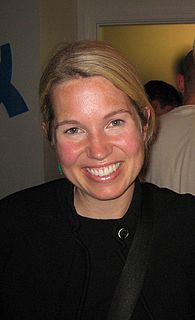A Quote by Kent Beck
I'm not a great programmer; I'm just a good programmer with great habits.
Quote Topics
Related Quotes
I think that's the responsibility of the CEO and the CEOs below me: to make sure that we're constantly putting people in places where they have the opportunity to develop into those careers but also having a rewards and recognition system that allows a great programmer to stay as a great programmer.
The programmer, who needs clarity, who must talk all day to a machine that demands declarations, hunkers down into a low-grade annoyance. It is here that the stereotype of the programmer, sitting in a dim room, growling from behind Coke cans, has its origins. The disorder of the desk, the floor; the yellow Post-It notes everywhere; the whiteboards covered with scrawl: all this is the outward manifestation of the messiness of human thought. The messiness cannot go into the program; it piles up around the programmer.
When we take the position that it is not only the programmer's responsibility to produce a correct program but also to demonstrate its correctness in a convincing manner, then the above remarks have a profound influence on the programmer's activity: the object he has to produce must be usefully structured.
Before 'Dilbert,' I tried to become a computer programmer. In the early days of computing, I bought this big, heavy, portable computer for my house. I spent two years nights and weekends trying to write games that I thought I would sell. Turns out I'm not that good a programmer, so that was two years that didn't work out.
You become a serious programmer by going through a stage where you are fully aware of the degree to which you know the specification, meaning both the explicit and the tacit specification of your language and of your problem. "Hey, it works most of the time" is the very antithesis of a serious programmer, and certain languages can only support code like that.
When we look at these historical women and what they've gone through, it's shocking to recognize some of our own experiences in theirs. When you look at someone like Ada Lovelace who is the first computer programmer, during her lifetime doctors said that was really sick because she was trying to use a masculine kind of brain that she didn't have. Today, her legacy of being the first programmer is stil disputed.
































